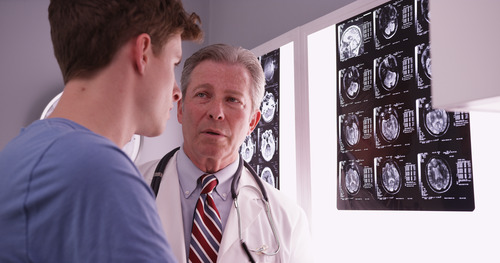A car accident injury can cause more than visible injuries; it can lead to subtle yet serious conditions like a concussion. A concussion is a type of traumatic brain injury that may not present immediate symptoms but can impact your overall well-being. Recognizing the signs of a concussion after a car accident early and seeking prompt medical attention is essential to prevent further complications and ensure a full recovery.
In this blog, we’ll cover the signs of a concussion after a car accident and highlight the importance of visiting our diagnostic imaging center in Colorado Springs for accurate evaluation and effective recovery.
What Is a Concussion?
A concussion is a type of traumatic brain injury (TBI) caused by a sudden jolt or blow to the head. This force disrupts normal brain function, often leading to temporary but significant changes in mental status or physical capabilities. While the brain is cushioned by cerebrospinal fluid, a severe impact can cause it to move or twist inside the skull, resulting in damage.
Common Causes
Concussions are frequently associated with activities that involve a sudden impact or motion. Car accidents, sports injuries, and falls are among the most common causes, with motor vehicle accidents being a significant contributor. In the context of a car accident, the rapid deceleration or abrupt force from a collision can lead to the brain striking the interior of the skull, even if the head does not visibly hit an object.
Early Warning Signs and Symptoms
Recognizing the early warning signs of a concussion after a car accident is essential for timely medical intervention and to prevent further complications by seeking immediate medical attention.
Physical Symptoms
Physical symptoms of a concussion often manifest shortly after the injury but may develop gradually over time, indicating head injuries. Persistent headaches are one of the most common indicators, especially if they differ from usual headache patterns. Dizziness, nausea, and vomiting may also occur, along with balance issues that make normal activities challenging. Sensitivity to light and sound is another common symptom, often leading to discomfort in bright or noisy environments.
Cognitive Symptoms
Cognitive signs of a concussion after a car accident can include difficulty concentrating, slowed thinking, and challenges with memory recall. Individuals may feel mentally “foggy,” struggling to articulate thoughts or follow conversations. Short-term memory issues, such as forgetting the events leading up to or following the injury, are common and should not be overlooked, even if the individual did not lose consciousness.
Emotional and Behavioral Changes
Mood changes can be an early indicator of concussion injuries. Irritability, anxiety, and sudden mood swings are frequently reported. Individuals may feel unusually emotional or have difficulty managing everyday stress. These changes are often accompanied by a sense of unease or frustration with their condition.
Sleep Disturbances
Sleep disruptions are another significant early symptom. A person may experience insomnia, excessive fatigue, or irregular sleep patterns following a head injury. Some individuals sleep more than usual in the initial days after the injury but later find it difficult to achieve restful sleep.
Importance of Early Recognition
Early identification of these symptoms is critical to managing a concussion after a car accident effectively. Ignoring these warning signs can lead to prolonged recovery and, in severe cases, further complications. Seeking immediate medical attention as soon as symptoms are noticed ensures appropriate care and supports a safer recovery.
Delayed and Severe Symptoms
While some symptoms of a concussion appear immediately, others may be delayed or signal a severe concussion, requiring urgent attention.
Symptoms That Develop Later
Concussion symptoms do not always manifest right after the injury. Cognitive issues, such as difficulty concentrating or a worsening sense of mental fog, may emerge hours or even days later. Similarly, headaches can persist or intensify over time, signaling that the injury is more significant than initially assumed. Sleep disturbances, including difficulty falling or staying asleep, may also appear after a delay, potentially leading to developing post-concussion syndrome.
Warning Signs of Severe Injury
Certain symptoms indicate a more serious brain injury, such as traumatic brain injuries, and should never be ignored. These include prolonged or worsening confusion, repeated vomiting, and severe headaches that do not subside with rest or medication. Seizures, loss of coordination, and profound weakness in one or more limbs also suggest severe complications requiring immediate medical evaluation.
Behavioral and Emotional Red Flags
Behavioral changes, such as extreme irritability, depression, or sudden mood swings, may indicate deeper neurological issues. Loved ones often notice these shifts before the individual does. A person who seems unusually withdrawn, aggressive, or emotionally unstable after a head injury should seek professional care.
Long-Term Risks of Ignoring Symptoms
Left untreated, delayed or severe symptoms can lead to long-term complications such as post-concussion syndrome or permanent brain damage. Persistent symptoms may also interfere with daily activities, work, or relationships, significantly impacting quality of life. Seeking prompt evaluation for severe or delayed signs ensures the best possible outcomes and prevents avoidable complications, including future medical bills.
Treatment and Recovery Options
Recovering from a concussion after a car accident requires a combination of medical treatment, rest, and tailored therapies to address symptoms and prevent long-term complications.
Initial Medical Evaluation
The first step in concussion treatment is a comprehensive medical evaluation. A healthcare provider will assess symptoms, conduct neurological tests, and, if necessary, order imaging scans to rule out more severe injuries. Early diagnosis allows for the creation of an effective recovery plan, especially for brain injuries.
Rest and Activity Modification
Rest is a cornerstone of recovery from a concussion after a car accident. Physical and cognitive rest, such as avoiding strenuous activity, screen time, and mentally taxing tasks, allows the brain to heal. As symptoms improve, patients are gradually reintroduced to normal activities under medical supervision to prevent setbacks.
Symptom Management
Targeted therapies can address specific symptoms. Pain management strategies, such as prescribed medications or over-the-counter options, help alleviate persistent headaches. Vestibular therapy may be recommended for balance issues, while vision therapy can assist those with visual disturbances. Cognitive therapy is also beneficial for addressing memory or concentration challenges.
Integrated Care Approaches
An integrated care model combining multiple disciplines is often effective for concussion recovery. Chiropractic care, massage therapy, and physical therapy can relieve associated neck pain and support overall healing. Collaboration among healthcare providers ensures a comprehensive treatment plan tailored to the patient’s needs.
Preventing Complications
Regular follow-ups with a healthcare provider are critical to monitoring progress and addressing any emerging issues. Education on pacing and symptom recognition helps patients avoid overexertion and reduces the risk of developing post-concussion syndrome. For severe cases, referrals to specialists may be necessary for advanced care.
Long-Term Outlook
With proper treatment and adherence to medical guidance, most individuals recover fully from a concussion after a car accident. However, the recovery timeline varies depending on the severity of the injury and the individual’s overall health. Early intervention and consistent care play a vital role in achieving the best possible outcome.
Steps to Take If You Suspect a Concussion After a Car Accident
Prompt action is essential if you suspect a concussion after a car accident, as early intervention can prevent complications and support recovery.
Seek Medical Attention Immediately
The first and most crucial step is to consult a healthcare professional. Even if symptoms appear mild, a thorough evaluation can identify the extent of the injury and rule out more serious conditions. Delaying medical attention increases the risk of undetected complications, such as internal bleeding or swelling, especially if the person loses consciousness.
Avoid Physical Activity
Refrain from engaging in physical activities, including exercise and heavy lifting, until cleared by a doctor. Physical exertion can worsen symptoms and delay healing. Resting the body and mind is critical during the initial recovery period.
Monitor Symptoms Closely
Keep track of symptoms and note any changes or worsening conditions. Common issues like headaches, dizziness, or confusion should gradually improve with time. However, if symptoms such as vomiting, seizures, or prolonged memory loss occur, seek emergency medical care.
Inform Key Contacts
Notify family members, coworkers, or school personnel about the suspected concussion injuries. This ensures they can provide support and understand any temporary limitations or accommodations required during recovery.
Follow Medical Advice
Adhere to the treatment plan provided by your healthcare provider. This may include rest, medication for symptom relief, and follow-up appointments. Avoid returning to regular activities, including work or sports, until given medical clearance to prevent re-injury.
Document the Incident
If the concussion is the result of an accident, document the circumstances as soon as possible. Gather relevant details, such as the date, time, and location of the incident, along with contact information for any witnesses. This information can be valuable if legal or insurance claims arise.
Educate Yourself About Concussions
Take time to understand the nature of concussions and the importance of proper recovery. Knowing what to expect and recognizing potential warning signs can empower you to manage the injury effectively and avoid complications.
Prioritize Your Health & Visit Our Colorado Springs Diagnostic Imaging Center ASAP!
If you suspect you may have a concussion after a car accident, it’s critical to take action right away. At Hurt 911® Colorado, our dedicated team is here to provide the care, guidance, and support you need during this challenging time. From helping you identify the signs of a concussion to ensuring you receive the proper medical attention, we’re committed to your health and recovery every step of the way.
Contact us at 720-414-0000 today to schedule an appointment with us!




